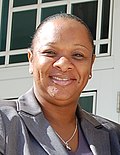| Premier of the Turks and Caicos Islands | |
|---|---|
 | |
 | |
| Government of the Turks and Caicos Islands Cabinet of the Turks and Caicos Islands | |
| Style | The Honourable |
| Member of | |
| Nominator | Political parties |
| Appointer | Governor of the Turks and Caicos Islands |
| Term length | At the governor's pleasure |
| Formation | 31 August 1976 |
| First holder | James Alexander George Smith McCartney as Chief Minister |
| Deputy | Deputy Premier of the Turks and Caicos Islands (Jamell Robinson) [1] |
 |
|---|
| Constitution |
| Administrative divisions |
The Premier of the Turks and Caicos Islands is the political leader and head of government. The post of premier is the equivalent to chief minister or prime minister in other British Overseas Territories. It is the highest political level that can be attained within the British colonial system. Prior to 2006, the position was known as the Chief Minister of the Turks and Caicos Islands.
Contents
The premier and Cabinet (consisting of all the most senior ministers) are collectively accountable for their policies and actions to King Charles III, to the Parliament, to their political party and ultimately to the electorate.
The current premier is Charles Washington Misick, since 20 February 2021.





